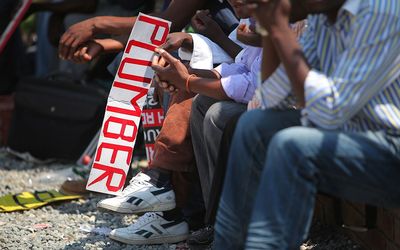INTERNATIONAL media refer to it as a "looming catastrophe", but domestic media appear less alarmed by Statistics SA’s announcement last month that the South African economy shed 355,000 jobs in the first quarter of 2016.
It appears that members of the media are in denial about the unfolding crisis because to face it would require confronting the terrible truth about capital’s expansion and its dreadful cost to humanity.
The media’s response dilutes the true nature of the crisis we face. Many news outlets chose to disseminate the disputed analysis of establishment economist Neva Makgetla, who claimed Stats SA’s sample was problematic, implying that the situation is not as bad as it appears.
Statistician-General Pali Lehohla has refuted that claim. Stats SA’s figures have now been shored up by findings in a global report released at the end of May.
The IMD Global Competitiveness Report confirms that SA has the world’s worst unemployment rate.
There is no hiding from the truth. The economy is bleeding jobs, most of which can be attributed to capitalism’s crisis of unrestrained financialisation, overproduction, low wages, poor demand, extreme wealth concentration and environmental degradation. Metal and engineering sector workers are among those bearing the brunt of the jobs carnage. By the end of 2015, about 40,000 jobs had been lost in the engineering sector alone.
The onslaught continues. In February, 1,800 National Union of Metalworkers of SA (Numsa) and Solidarity members received retrenchment notices from Evraz Highveld Steel and Vanadium, a company going under due to low steel demand following the slowdown in the Chinese economy. Russian billionaire owner Roman Abramovich was obstructive in 2015, when it came to a rescue sale that would have saved these jobs. So much for Brics solidarity!
Meanwhile, a government-financed reskilling programme that could have rerouted the Evraz Highveld Steel jobs in the direction of local supply chains, is falling through due to lack of funding from the Department of Labour and the Industrial Development Corporation. Metal workers’ jobs must be saved. To this end, Numsa demands the nationalisation of Evraz Highveld Steel and of ArcelorMittal SA.
Looking beyond the concerns of our immediate constituency in the metals and engineering sector, Numsa sees that nobody is safe from capitalism’s crisis. We have not had to look too hard to find its fingerprints on a range of retrenchments that have come to our recent attention. Workers and the poor always pay the price for capitalism’s expansion. This is especially the case when the global casino is petitioned.
It is scandalous that Finance Minister Pravin Gordhan plans to shed all nonessential public service jobs, while freezing vacant posts just to please the ratings agencies.
This can only result in more suffering for the mothers and children in our already understaffed and poorly functioning schools and hospitals. The situation is aggravated by the fact that more than 16-million welfare and pension grant recipients are losing several percent of their after-inflation income, thanks to Gordhan’s miserliness.
Similarly, clothing retailer Edcon will retrench half its 3,000 head office staff this year. Despite posting a turnaround in profits, the key motive behind Edcon’s decision to downsize is an inability to service bond payments. The company has been on its knees ever since being acquired by an American private equity firm — not the first round of retrenchments Edcon has experienced since that acquisition.
Meanwhile, technological advancements are cannibalising jobs in the banking and communications sectors. Banking giant First National Bank has already started a process to retrench 600 employees and to close branches as customers switch to digital banking. At the same time Telkom, which originally announced that it would cut its staff by 40% this year, now says it will halt retrenchments for the next two years, but still plans to push 1,000 of its staff into the precarious world of outsourced labour. Has Telkom learnt nothing from South Africa’s brave university students, who exposed the injustice of outsourcing?
Nevertheless, the worst of the jobs bloodbath in 2016 will take place in the mining industry, where mining houses are shedding jobs at an unparalleled rate. Retrenchments are expected to reach 36,000 in 2016.
The root cause of retrenchments is said to be the drop in commodity prices. But job losses are also caused by the march towards mechanisation by mining houses seeking to reduce their exposure to organised labour. About 30% of SA’s platinum already comes from mechanised mines.
Gold mining is set to follow suit. Our mining jobs will be lost for good.
Then there is the case of farm workers losing their jobs to the El Nino-induced drought, notably in the Free State.
Anyone who believes that the blame for this cannot be laid at capitalism’s door is in denial. This is absolutely capitalism’s fault. Extreme weather phenomena, which previously happened once or twice every century, are now taking place more frequently with greater intensity.
This has everything to do with the insatiable hunger of consumer-orientated capitalist societies driving demand and productivity in high-carbon economies.
Capitalism’s poor stewardship of the environment is causing damage that will be felt far into the future.
What is to become of all these people who are losing their jobs? Are there plans to absorb them in other sectors? The answer is no. There are no serious efforts under way to tackle the plight of retrenched workers. The job-shedding crisis is assisted by public indifference, poor political will, false solutions and corporate callousness.
Most alarming is the cold-hearted response of the business community. As technological advances and mechanisation reduce the need for human labour, there is a worrying murmur coming from SA’s capitalist class. They say that there will be clear winners and losers in the economy.
They speak of pockets of excellence in the labour force. They speak of geographical nodes of excellence.
We understand what this means.
It means the weak will be discarded. It means large numbers of poorly educated black South Africans struggling in townships and rural villages will be left to their own devices. Those who attempt to mask the reality of our untransformed economy do us no favours. The more they cover up the lived reality of economic exclusion, the more they fuel social tensions.
This is why youth who find themselves at the sharp end of interacting with a racially and economically defined elite system at our universities have exhibited such fierce anger. More than 20 years into our democracy, black South Africans can see that this economy is not working for us.
At the end of the day, South African capitalism continues to thrive on racialised inequality. We see the capitalist rationale being applied in ever innovative ways to maintain the apartheid status quo.
To save our jobs and our economy and to bring some dignity to our people, we need an alternative to capitalism.
That alternative is socialism.
• Jim is the general secretary of Numsa
























